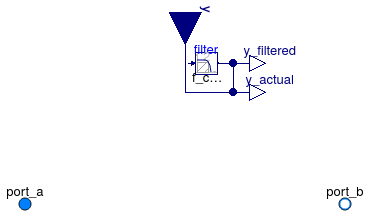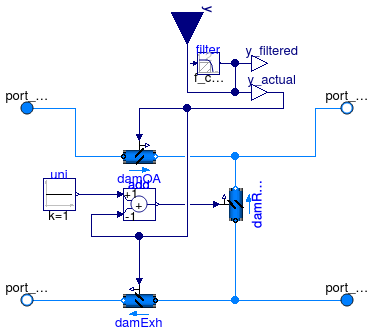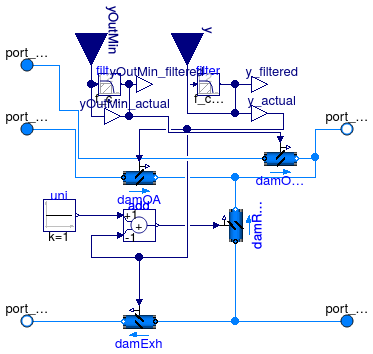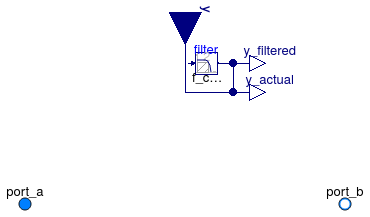Buildings.Fluid.Actuators.Dampers
Package with air damper models
Information
This package contains component models for air dampers. For motor models, see Buildings.Fluid.Actuators.Motors.Extends from Modelica.Icons.VariantsPackage (Icon for package containing variants).
Package Content
| Name | Description |
|---|---|
| Air damper with exponential opening characteristics | |
| Outside air mixing box with interlocked air dampers | |
| Outside air mixing box with parallel damper for minimum outside air flow rate | |
| Model for an air damper whose mass flow is proportional to the input signal | |
| VAV box with a fixed resistance plus a damper model withe exponential characteristics | |
| Collection of models that illustrate model use and test models |
 Buildings.Fluid.Actuators.Dampers.Exponential
Buildings.Fluid.Actuators.Dampers.Exponential
Air damper with exponential opening characteristics

Information
This model is an air damper with flow coefficient that is an exponential function
of the opening angle. The model is as in ASHRAE 825-RP.
A control signal of y=0 means the damper is closed, and y=1 means the damper
is open. This is opposite of the implementation of ASHRAE 825-RP, but used here
for consistency within this library.
For yL < y < yU, the damper characteristics is
kd(y) = exp(a+b (1-y)).
Outside this range, the damper characteristic is defined by a quadratic polynomial that
matches the damper resistance at y=0 and y=yL or y=yU and
y=1, respectively. In addition, the polynomials are such that
kd(y) is
differentiable in y and the derivative is continuous.
The damper characteristics kd(y) is then used to compute the flow coefficient k(y) as
k(y) = (2 ρ ⁄ kd(y))1/2 A,
where A is the face area, which is computed using the nominal
mass flow rate m_flow_nominal, the nominal velocity
v_nominal and the density of the medium. The flow coefficient k(y)
is used to compute the mass flow rate versus pressure
drop relation as
m = sign(Δp) k(y) √ Δp
with regularization near the origin.
ASHRAE 825-RP lists the following parameter values as typical:
| opposed blades | single blades | |
|---|---|---|
| yL | 15/90 | 15/90 |
| yU | 55/90 | 65/90 |
| k0 | 1E6 | 1E6 |
| k1 | 0.2 to 0.5 | 0.2 to 0.5 |
| a | -1.51 | -1.51 |
| b | 0.105*90 | 0.0842*90 |
References
P. Haves, L. K. Norford, M. DeSimone and L. Mei, A Standard Simulation Testbed for the Evaluation of Control Algorithms & Strategies, ASHRAE Final Report 825-RP, Atlanta, GA.
Extends from Buildings.Fluid.Actuators.BaseClasses.PartialDamperExponential (Partial model for air dampers with exponential opening characteristics).
Parameters
| Type | Name | Default | Description |
|---|---|---|---|
| replaceable package Medium | PartialMedium | Medium in the component | |
| MassFlowRate | m_flow_turbulent | if use_deltaM then deltaM*m_... | Turbulent flow if |m_flow| >= m_flow_turbulent [kg/s] |
| Boolean | use_deltaM | true | Set to true to use deltaM for turbulent transition, else ReC is used |
| Real | deltaM | 0.3 | Fraction of nominal mass flow rate where transition to turbulent occurs |
| Velocity | v_nominal | 1 | Nominal face velocity [m/s] |
| Boolean | roundDuct | false | Set to true for round duct, false for square cross section |
| Real | ReC | 4000 | Reynolds number where transition to turbulent starts |
| Real | kFixed | 0 | Flow coefficient of fixed resistance that may be in series with damper, k=m_flow/sqrt(dp), with unit=(kg.m)^(1/2). |
| Nominal condition | |||
| MassFlowRate | m_flow_nominal | Nominal mass flow rate [kg/s] | |
| PressureDifference | dp_nominal | (m_flow_nominal/kDam_default... | Pressure drop at nominal mass flow rate [Pa] |
| Assumptions | |||
| Boolean | allowFlowReversal | true | = false to simplify equations, assuming, but not enforcing, no flow reversal |
| Advanced | |||
| Diagnostics | |||
| Boolean | show_T | false | = true, if actual temperature at port is computed |
| Boolean | from_dp | false | = true, use m_flow = f(dp) else dp = f(m_flow) |
| Boolean | homotopyInitialization | true | = true, use homotopy method |
| Boolean | linearized | false | = true, use linear relation between m_flow and dp for any flow rate |
| Boolean | use_constant_density | true | Set to true to use constant density for flow friction |
| Dynamics | |||
| Filtered opening | |||
| Boolean | use_inputFilter | true | = true, if opening is filtered with a 2nd order CriticalDamping filter |
| Time | riseTime | 120 | Rise time of the filter (time to reach 99.6 % of an opening step) [s] |
| Init | init | Modelica.Blocks.Types.Init.I... | Type of initialization (no init/steady state/initial state/initial output) |
| Real | y_start | 1 | Initial value of output |
| Damper coefficients | |||
| Real | a | -1.51 | Coefficient a for damper characteristics |
| Real | b | 0.105*90 | Coefficient b for damper characteristics |
| Real | yL | 15/90 | Lower value for damper curve |
| Real | yU | 55/90 | Upper value for damper curve |
| Real | k0 | 1E6 | Flow coefficient for y=0, k0 = pressure drop divided by dynamic pressure |
| Real | k1 | 0.45 | Flow coefficient for y=1, k1 = pressure drop divided by dynamic pressure |
Connectors
| Type | Name | Description |
|---|---|---|
| FluidPort_a | port_a | Fluid connector a (positive design flow direction is from port_a to port_b) |
| FluidPort_b | port_b | Fluid connector b (positive design flow direction is from port_a to port_b) |
| input RealInput | y | Actuator position (0: closed, 1: open) |
| output RealOutput | y_actual | Actual valve position |
Modelica definition
 Buildings.Fluid.Actuators.Dampers.MixingBox
Buildings.Fluid.Actuators.Dampers.MixingBox
Outside air mixing box with interlocked air dampers

Information
Model of an outside air mixing box with air dampers.
Set y=0 to close the outside air and exhast air dampers.
If dp_nominalIncludesDamper=true, then the parameter dp_nominal
is equal to the pressure drop of the damper plus the fixed flow resistance at the nominal
flow rate.
If dp_nominalIncludesDamper=false, then dp_nominal
does not include the flow resistance of the air damper.
Extends from Buildings.Fluid.Actuators.BaseClasses.ActuatorSignal (Partial model that implements the filtered opening for valves and dampers).
Parameters
| Type | Name | Default | Description |
|---|---|---|---|
| replaceable package Medium | Modelica.Media.Interfaces.Pa... | Medium in the component | |
| Boolean | use_deltaM | true | Set to true to use deltaM for turbulent transition, else ReC is used |
| Real | deltaM | 0.3 | Fraction of nominal mass flow rate where transition to turbulent occurs |
| Velocity | v_nominal | 1 | Nominal face velocity [m/s] |
| Boolean | roundDuct | false | Set to true for round duct, false for square cross section |
| Real | ReC | 4000 | Reynolds number where transition to turbulent starts |
| Nominal condition | |||
| Boolean | dp_nominalIncludesDamper | false | set to true if dp_nominal includes the pressure loss of the open damper |
| MassFlowRate | mOut_flow_nominal | Mass flow rate outside air damper [kg/s] | |
| PressureDifference | dpOut_nominal | Pressure drop outside air leg [Pa] | |
| MassFlowRate | mRec_flow_nominal | Mass flow rate recirculation air damper [kg/s] | |
| PressureDifference | dpRec_nominal | Pressure drop recirculation air leg [Pa] | |
| MassFlowRate | mExh_flow_nominal | Mass flow rate exhaust air damper [kg/s] | |
| PressureDifference | dpExh_nominal | Pressure drop exhaust air leg [Pa] | |
| Dynamics | |||
| Filtered opening | |||
| Boolean | use_inputFilter | true | = true, if opening is filtered with a 2nd order CriticalDamping filter |
| Time | riseTime | 120 | Rise time of the filter (time to reach 99.6 % of an opening step) [s] |
| Init | init | Modelica.Blocks.Types.Init.I... | Type of initialization (no init/steady state/initial state/initial output) |
| Real | y_start | 1 | Initial value of output |
| Assumptions | |||
| Boolean | allowFlowReversal | true | = false to simplify equations, assuming, but not enforcing, no flow reversal |
| Advanced | |||
| Boolean | from_dp | true | = true, use m_flow = f(dp) else dp = f(m_flow) |
| Boolean | linearized | false | = true, use linear relation between m_flow and dp for any flow rate |
| Boolean | use_constant_density | true | Set to true to use constant density for flow friction |
| Damper coefficients | |||
| Real | a | -1.51 | Coefficient a for damper characteristics |
| Real | b | 0.105*90 | Coefficient b for damper characteristics |
| Real | yL | 15/90 | Lower value for damper curve |
| Real | yU | 55/90 | Upper value for damper curve |
| Real | k0 | 1E6 | Flow coefficient for y=0, k0 = pressure drop divided by dynamic pressure |
| Real | k1 | 0.45 | Flow coefficient for y=1, k1 = pressure drop divided by dynamic pressure |
Connectors
| Type | Name | Description |
|---|---|---|
| input RealInput | y | Actuator position (0: closed, 1: open) |
| output RealOutput | y_actual | Actual valve position |
| replaceable package Medium | Medium in the component | |
| FluidPort_a | port_Out | Fluid connector a (positive design flow direction is from port_a to port_b) |
| FluidPort_b | port_Exh | Fluid connector b (positive design flow direction is from port_a to port_b) |
| FluidPort_a | port_Ret | Fluid connector a (positive design flow direction is from port_a to port_b) |
| FluidPort_b | port_Sup | Fluid connector b (positive design flow direction is from port_a to port_b) |
Modelica definition
 Buildings.Fluid.Actuators.Dampers.MixingBoxMinimumFlow
Buildings.Fluid.Actuators.Dampers.MixingBoxMinimumFlow
Outside air mixing box with parallel damper for minimum outside air flow rate

Information
Model of an outside air mixing box with air dampers and a flow path for the minimum outside air flow rate.
If dp_nominalIncludesDamper=true, then the parameter dp_nominal
is equal to the pressure drop of the damper plus the fixed flow resistance at the nominal
flow rate.
If dp_nominalIncludesDamper=false, then dp_nominal
does not include the flow resistance of the air damper.
Extends from Buildings.Fluid.Actuators.Dampers.MixingBox (Outside air mixing box with interlocked air dampers).
Parameters
| Type | Name | Default | Description |
|---|---|---|---|
| replaceable package Medium | PartialMedium | Medium in the component | |
| Boolean | use_deltaM | true | Set to true to use deltaM for turbulent transition, else ReC is used |
| Real | deltaM | 0.3 | Fraction of nominal mass flow rate where transition to turbulent occurs |
| Velocity | v_nominal | 1 | Nominal face velocity [m/s] |
| Boolean | roundDuct | false | Set to true for round duct, false for square cross section |
| Real | ReC | 4000 | Reynolds number where transition to turbulent starts |
| Nominal condition | |||
| Boolean | dp_nominalIncludesDamper | false | set to true if dp_nominal includes the pressure loss of the open damper |
| MassFlowRate | mOut_flow_nominal | Mass flow rate outside air damper [kg/s] | |
| PressureDifference | dpOut_nominal | Pressure drop outside air leg [Pa] | |
| MassFlowRate | mRec_flow_nominal | Mass flow rate recirculation air damper [kg/s] | |
| PressureDifference | dpRec_nominal | Pressure drop recirculation air leg [Pa] | |
| MassFlowRate | mExh_flow_nominal | Mass flow rate exhaust air damper [kg/s] | |
| PressureDifference | dpExh_nominal | Pressure drop exhaust air leg [Pa] | |
| MassFlowRate | mOutMin_flow_nominal | Mass flow rate minimum outside air damper [kg/s] | |
| PressureDifference | dpOutMin_nominal | Pressure drop minimum outside air leg [Pa] | |
| Dynamics | |||
| Filtered opening | |||
| Boolean | use_inputFilter | true | = true, if opening is filtered with a 2nd order CriticalDamping filter |
| Time | riseTime | 120 | Rise time of the filter (time to reach 99.6 % of an opening step) [s] |
| Init | init | Modelica.Blocks.Types.Init.I... | Type of initialization (no init/steady state/initial state/initial output) |
| Real | y_start | 1 | Initial value of output |
| Real | yOutMin_start | y_start | Initial value of signal for minimum outside air damper |
| Assumptions | |||
| Boolean | allowFlowReversal | true | = false to simplify equations, assuming, but not enforcing, no flow reversal |
| Advanced | |||
| Boolean | from_dp | true | = true, use m_flow = f(dp) else dp = f(m_flow) |
| Boolean | linearized | false | = true, use linear relation between m_flow and dp for any flow rate |
| Boolean | use_constant_density | true | Set to true to use constant density for flow friction |
| Damper coefficients | |||
| Real | a | -1.51 | Coefficient a for damper characteristics |
| Real | b | 0.105*90 | Coefficient b for damper characteristics |
| Real | yL | 15/90 | Lower value for damper curve |
| Real | yU | 55/90 | Upper value for damper curve |
| Real | k0 | 1E6 | Flow coefficient for y=0, k0 = pressure drop divided by dynamic pressure |
| Real | k1 | 0.45 | Flow coefficient for y=1, k1 = pressure drop divided by dynamic pressure |
Connectors
| Type | Name | Description |
|---|---|---|
| input RealInput | y | Actuator position (0: closed, 1: open) |
| output RealOutput | y_actual | Actual valve position |
| FluidPort_a | port_Out | Fluid connector a (positive design flow direction is from port_a to port_b) |
| FluidPort_b | port_Exh | Fluid connector b (positive design flow direction is from port_a to port_b) |
| FluidPort_a | port_Ret | Fluid connector a (positive design flow direction is from port_a to port_b) |
| FluidPort_b | port_Sup | Fluid connector b (positive design flow direction is from port_a to port_b) |
| FluidPort_a | port_OutMin | Fluid connector a (positive design flow direction is from port_a to port_b) |
| input RealInput | yOutMin | Damper position minimum outside air (0: closed, 1: open) |
| output RealOutput | yOutMin_actual | Actual valve position |
Modelica definition
 Buildings.Fluid.Actuators.Dampers.PressureIndependent
Buildings.Fluid.Actuators.Dampers.PressureIndependent
Model for an air damper whose mass flow is proportional to the input signal

Information
Model for an air damper whose airflow is proportional to the input signal, assuming
that at y = 1, m_flow = m_flow_nominal. This is unless the pressure difference
dp is too low,
in which case a kDam = m_flow_nominal/sqrt(dp_nominal) characteristic is used.
The model is similar to Buildings.Fluid.Actuators.Valves.TwoWayPressureIndependent, except for adaptations for damper parameters. Please see that documentation for more information.
Extends from Buildings.Fluid.BaseClasses.PartialResistance (Partial model for a hydraulic resistance), Buildings.Fluid.Actuators.BaseClasses.ActuatorSignal (Partial model that implements the filtered opening for valves and dampers).
Parameters
| Type | Name | Default | Description |
|---|---|---|---|
| replaceable package Medium | PartialMedium | Medium in the component | |
| MassFlowRate | m_flow_turbulent | if use_deltaM then deltaM*m_... | Turbulent flow if |m_flow| >= m_flow_turbulent [kg/s] |
| Boolean | use_deltaM | true | Set to true to use deltaM for turbulent transition, else ReC is used |
| Real | deltaM | 0.3 | Fraction of nominal mass flow rate where transition to turbulent occurs |
| Velocity | v_nominal | 1 | Nominal face velocity [m/s] |
| Boolean | roundDuct | false | Set to true for round duct, false for square cross section |
| Real | ReC | 4000 | Reynolds number where transition to turbulent starts |
| Nominal condition | |||
| MassFlowRate | m_flow_nominal | Nominal mass flow rate [kg/s] | |
| PressureDifference | dp_nominal | Pressure drop at nominal mass flow rate [Pa] | |
| PressureDifference | dpFixed_nominal | 0 | Pressure drop of duct and other resistances that are in series [Pa] |
| Assumptions | |||
| Boolean | allowFlowReversal | true | = false to simplify equations, assuming, but not enforcing, no flow reversal |
| Advanced | |||
| Diagnostics | |||
| Boolean | show_T | false | = true, if actual temperature at port is computed |
| Boolean | from_dp | true | = true, use m_flow = f(dp) else dp = f(m_flow) |
| Boolean | homotopyInitialization | true | = true, use homotopy method |
| Boolean | linearized | false | = true, use linear relation between m_flow and dp for any flow rate |
| Boolean | use_constant_density | true | Set to true to use constant density for flow friction |
| Real | l | 0.0001 | Damper leakage, l=kDam(y=0)/kDam(y=1) |
| Real | l2 | 0.01 | Gain for mass flow increase if pressure is above nominal pressure [1] |
| Real | deltax | 0.02 | Transition interval for flow rate [1] |
| Dynamics | |||
| Filtered opening | |||
| Boolean | use_inputFilter | true | = true, if opening is filtered with a 2nd order CriticalDamping filter |
| Time | riseTime | 120 | Rise time of the filter (time to reach 99.6 % of an opening step) [s] |
| Init | init | Modelica.Blocks.Types.Init.I... | Type of initialization (no init/steady state/initial state/initial output) |
| Real | y_start | 1 | Initial value of output |
Connectors
| Type | Name | Description |
|---|---|---|
| FluidPort_a | port_a | Fluid connector a (positive design flow direction is from port_a to port_b) |
| FluidPort_b | port_b | Fluid connector b (positive design flow direction is from port_a to port_b) |
| input RealInput | y | Actuator position (0: closed, 1: open) |
| output RealOutput | y_actual | Actual valve position |
Modelica definition
 Buildings.Fluid.Actuators.Dampers.VAVBoxExponential
Buildings.Fluid.Actuators.Dampers.VAVBoxExponential
VAV box with a fixed resistance plus a damper model withe exponential characteristics

Information
Model of two resistances in series. One resistance has a fixed flow coefficient, the other resistance is an air damper whose flow coefficient is an exponential function of the opening angle.
If dp_nominalIncludesDamper=true, then the parameter dp_nominal
is equal to the pressure drop of the damper plus the fixed flow resistance at the nominal
flow rate.
If dp_nominalIncludesDamper=false, then dp_nominal
does not include the flow resistance of the air damper.
Extends from Buildings.Fluid.Actuators.BaseClasses.PartialDamperExponential (Partial model for air dampers with exponential opening characteristics).
Parameters
| Type | Name | Default | Description |
|---|---|---|---|
| replaceable package Medium | PartialMedium | Medium in the component | |
| MassFlowRate | m_flow_turbulent | if use_deltaM then deltaM*m_... | Turbulent flow if |m_flow| >= m_flow_turbulent [kg/s] |
| Boolean | use_deltaM | true | Set to true to use deltaM for turbulent transition, else ReC is used |
| Real | deltaM | 0.3 | Fraction of nominal mass flow rate where transition to turbulent occurs |
| Velocity | v_nominal | 1 | Nominal face velocity [m/s] |
| Boolean | roundDuct | false | Set to true for round duct, false for square cross section |
| Real | ReC | 4000 | Reynolds number where transition to turbulent starts |
| Real | kFixed | sqrt(kResSqu) | Flow coefficient of fixed resistance that may be in series with damper, k=m_flow/sqrt(dp), with unit=(kg.m)^(1/2). |
| Nominal condition | |||
| MassFlowRate | m_flow_nominal | Nominal mass flow rate [kg/s] | |
| PressureDifference | dp_nominal | Pressure drop at nominal mass flow rate [Pa] | |
| Boolean | dp_nominalIncludesDamper | true | set to true if dp_nominal includes the pressure loss of the open damper |
| Assumptions | |||
| Boolean | allowFlowReversal | true | = false to simplify equations, assuming, but not enforcing, no flow reversal |
| Advanced | |||
| Diagnostics | |||
| Boolean | show_T | false | = true, if actual temperature at port is computed |
| Boolean | from_dp | false | = true, use m_flow = f(dp) else dp = f(m_flow) |
| Boolean | homotopyInitialization | true | = true, use homotopy method |
| Boolean | linearized | false | = true, use linear relation between m_flow and dp for any flow rate |
| Boolean | use_constant_density | true | Set to true to use constant density for flow friction |
| Dynamics | |||
| Filtered opening | |||
| Boolean | use_inputFilter | true | = true, if opening is filtered with a 2nd order CriticalDamping filter |
| Time | riseTime | 120 | Rise time of the filter (time to reach 99.6 % of an opening step) [s] |
| Init | init | Modelica.Blocks.Types.Init.I... | Type of initialization (no init/steady state/initial state/initial output) |
| Real | y_start | 1 | Initial value of output |
| Damper coefficients | |||
| Real | a | -1.51 | Coefficient a for damper characteristics |
| Real | b | 0.105*90 | Coefficient b for damper characteristics |
| Real | yL | 15/90 | Lower value for damper curve |
| Real | yU | 55/90 | Upper value for damper curve |
| Real | k0 | 1E6 | Flow coefficient for y=0, k0 = pressure drop divided by dynamic pressure |
| Real | k1 | 0.45 | Flow coefficient for y=1, k1 = pressure drop divided by dynamic pressure |
Connectors
| Type | Name | Description |
|---|---|---|
| FluidPort_a | port_a | Fluid connector a (positive design flow direction is from port_a to port_b) |
| FluidPort_b | port_b | Fluid connector b (positive design flow direction is from port_a to port_b) |
| input RealInput | y | Actuator position (0: closed, 1: open) |
| output RealOutput | y_actual | Actual valve position |
